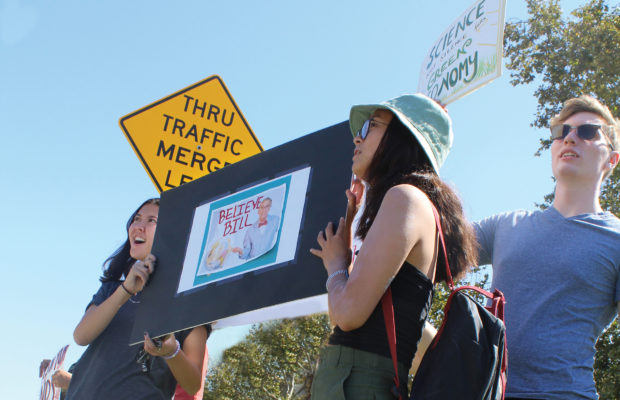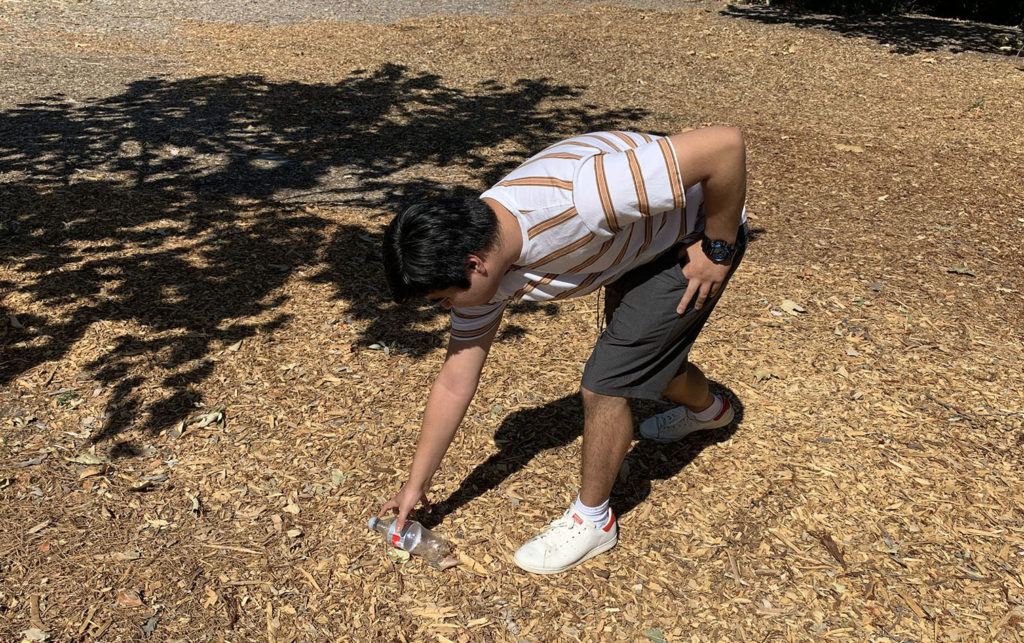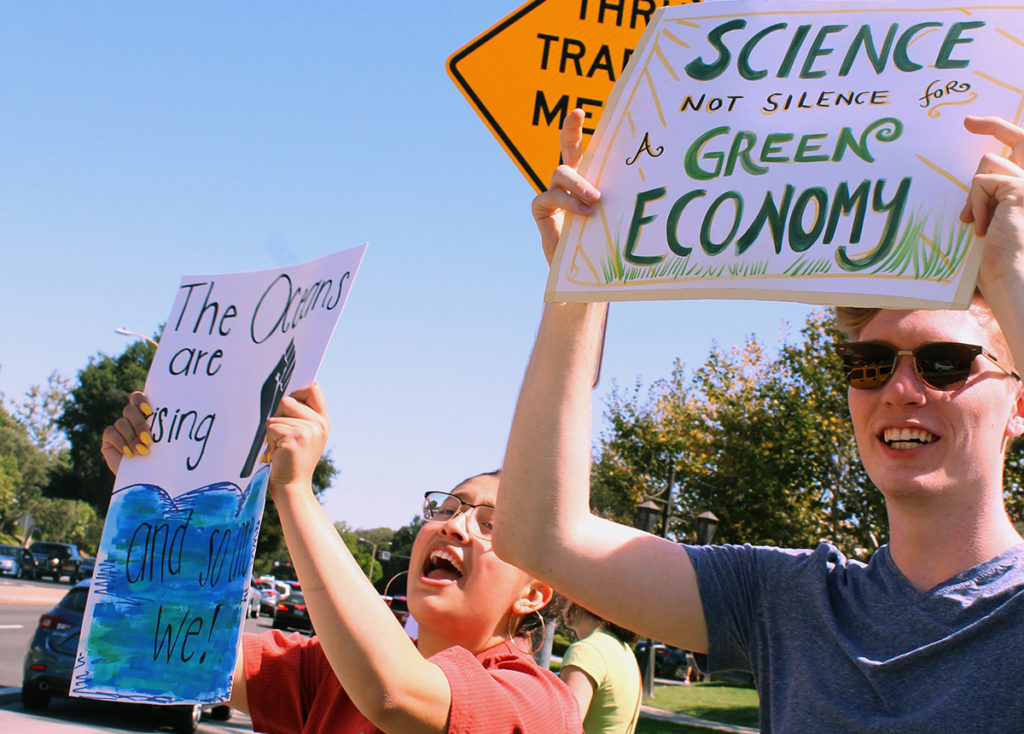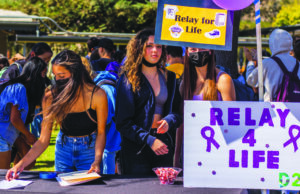Go big, go green

As the consequences of environmental destruction are becoming more and more apparent, action for environmental protection has become a modern urgency for every individual across the globe. Community members in Conejo Valley have come together to help save the environment in a variety of ways such as organizing clubs, participating in protests and calling for environmental friendly political agendas.
Students taking the lead

The recent increase in environmental awareness has encouraged several student groups within the community to take it upon themselves and speak openly about issues that impact their lives, in addition to how individuals can help aid in the process.
One of these groups, Hands On Earth, is a club on campus working to increase awareness and encourage environmental consciousness on campus. Led by Firdausi Noorzay and Megan Sager, seniors, the club meets every Friday at lunch in room D8, and they are planning many events this year to bring environmental activism to students. “We’re actually going to be doing things like beach clean-ups, and cleaning trails, ways to make the school more environmentally cautious,” Noorzay said.
Gardening and health is also important to the members of the Hands on Earth club. In the past year, the club inherited the school garden, and has been incorporating it into the responsibilities of the club. “ Everything that we serve (at club meetings) is vegan. . .a lot from the school garden directly,” Sager said.
The club is not just about gardening and nature, however. Hands on Earth also strives to promote activism for current environmental issues, from within Conejo Valley to the global scale. “We’re going to be doing some meetings where we talk about current issues and learn about what’s happening and ways that we can help. Small or big ways,” Noorzay said.
Recycling club is another student group with a goal to benefit the environment, beginning with an issue that has a direct impact on the school – recycling.
Brian Chau, junior, has been a member of Recycling Club since he joined his freshman year after taking notice of the state of the campus. “I joined just to help clean up the school. During lunch, or after, you can see all the trash laying around and I feel like I wanted to help,” Chau said.
Every other Wednesday, the Recycling club meets at their shed next to the football field and disperses throughout the campus to complete their task. “We go through all of the recycling bins, and we just collect the recyclable items. This includes plastic bottles, glass bottles, aluminum cans.” Nathan Juan, senior and president of the club, said. Then, the collected items are brought to be exchanged at one of the local recycling centers.
Juan joined the club after being encouraged to do so by his tennis teammates junior year, but the payoff has been beyond the community service. “Recycling is actually a pretty fun thing to do. We have a nice group of people, and just knowing that we’re taking care of our campus really makes me feel good.” says Juan.
As a club, their primary goal is to clean up the school, but they also strive to benefit other student groups on campus. “We store up the money (from the recycling center) in our account, and any club that wants to, they can apply to get some of that.” Chau said.
The club hopes to help others recognize the value of recycling to any extent, whether a small contribution or large-scale event. “This is a good opportunity for me to lessen my impact on the environment and just improve, decrease my footprint on this world.” Juan said.
Environmental issues are a pertinent topic of discussion in today’s modern world; both of these clubs demonstrate the increase in youth awareness, as well as civic engagement, to the subject. No matter the size of the actions, individuals within the community can help contribute to making a difference on what is a global scale issue.
Politicians take action
Environmental protection is inseparable from the country’s leaders and policies.
As democratic candidates are continuing to prepare themselves for the 2020 presidential election, the issue of climate change took a prominent position in many of their campaigns. At the September CNN Climate Town Hall, many democratic candidates, such as Elizabeth Warren, Joe Biden, Bernie Sanders and Pete Buttigieg all took a stance against bad human activity and aim to convert America into an environmentally sustainable country.
At the Town Hall, Elizabeth Warren, Massachusetts senator, reminds Americans to focus on the big problems and not get distracted by irrelevant issues. Instead of focusing on energy efficient light bulbs and straw types, Warren calls out big industries that are polluting our environment such as the building industry, oil industry and the electric power industry.
When faced with the crucial issue of climate change, the country looks towards its leaders for guidance, and in the case of Conejo Valley, the school board and local political parties.
Conejo Valley Unified School District board trustee Cindy Goldberg provided insight on how schools can help prevent the effects of climate change. “We need to educate students about the factual realities of climate change as defined by scientists and within the framework of science and social studies,” Goldberg said.
Goldberg also says she believes that the school board alone can not create change, however. “I would also encourage teachers, students, and other community members to get involved and create initiatives that fit their school sites and can become models for the rest of the district,” Goldberg said.
When asked about the amount of plastic wrapping used for school meals and what policies the Conejo Valley school district board can do Goldberg said, “I know that there has been a concerted effort to reduce waste, and I would hope that we can continue to improve and support those efforts. Best practices in other districts should be consulted and potentially implemented.”
One strong advocate for environmental protection across the country is the Green Party. With ecology as one of their four main pillars, they believe human activity and the country’s unregulated economic system are the main forces pushing the climate crisis. In order to help solve these issues, the Party’s main priority is to reduce greenhouse gas emissions and remove greenhouse gasses from the atmosphere.
Anthony Krzywicki, Green Party volunteer in Conejo Valley, is engaged in many efforts with the local party to deal with the climate catastrophe. Their goals are to expand their values to more people and gain more members to help with local campaigns and make policy changes.
“I believe that our party’s platform touches on everyone lives at a very human level. We want to put people, planet and peace before corporate profits. We want a just system in place that is for the betterment of everyone. I really feel that our platform and everything we do embodies good and justice and hope that others will join us,” Krzywicki said.
The local community can help the Green Party’s efforts in many ways, such as helping them promote environmentally friendly candidates and telling representatives their opinions on environmental policies. “As a party we are very excited to see the youth becoming involved and active in the climate debate. We hope that the youth will see that our party has been behind the scenes fighting for the environment for decades and hope that they will join us and run campaigns to gain positions to make policy decisions locally and nationally as a registered green,” Krzywicki said.
Striking for change

On Sept. 20, young people took to the streets and took part in a strike to demand action from world leaders to prevent climate change. This event kickstarted the “Global Week for Future,” a week in which strikes and protests were held to get people to act on climate change.
Alyssa Michalek, senior, took part in the climate strike in order to push for change in environmental policy.
“I went out and participated because I think it’s important to advocate for what you believe in, “ Michalek said. “And in this case, I think it’s vital for people to speak up, because climate change is happening much quicker than predicted, and it’s not something we can escape.”
Others say they are participating in the fight for climate activism because they worry that if they do not act, no one else will.
“I think climate change is a really scary issue, but I can’t really be worried about it if we don’t try to do anything,” Mikkel Nagorssen, senior, said.
Nagorssen used the climate strike as a way to showcase his support for climate activism and make his voice heard. As the strike went on, more and more people contributed to the effort.
“The atmosphere was pretty good from the beginning,” Nagorssen said. “A lot of the drivers were very supportive and the people were very friendly and engaged.”
Many students, such as Gia Chu, senior, are hopeful about the strikes and believe that these strikes are going to influence lawmakers to prevent climate change.
“I definitely think that these strikes are already causing huge change worldwide in big cities like New York where there were hundreds of thousands of people out protesting, and I think it’s impossible for any politician or lawmakers not just in the US to ignore the strength that the movement is gaining in numbers,” Chu said.
Individuals that participated in the climate strike all have different backgrounds, but there is one thing in common between every participant in the climate strike: they each care for the future of the Earth and the wellbeing of the human race.
“Climate change is not a political debate. It’s happening whether we act on it or not, and it’s going to affect everyone no matter the political party or status in society or gender or race or anything else,” Michalek said. “This can’t be put off for later. Change needs to happen now.”
Living a green life
Buy solid bar shampoo and soap
We throw away millions of shampoo and soap bottles every year, but the solution may be easier than you may think. Shampoo bars can come “naked”, or without any plastic packaging, preventing the waste of the bottles.
Ride your bike to school and use public transportation
Bikes do not emit any carbon emissions, but even if you live far from school, the city of Thousand Oaks offers a bus service that can drop students off directly in front of the PAC. If you are unable to utilize the metro system, even carpooling will greatly reduce your carbon footprint.
Limit your meat consumption
Meat may be hard to let go of, but if you manage to limit your meat consumption to one instance a day, you will be doing the environment a great service. Much of the resources are used towards red meat production and transportation. You can also start by substituting red meat with other meats that require less resources, such as chicken or fish.
Go thrifting
While many people go thrifting because of the good deals and styles, thrift store shopping can reduce the manufacturing that deplete natural resources, as well as recycle clothing that would have ended up in a landfill. Some great thrift stores in the area include Goodwill, the Mary Health of the Sick store located near Sequoia Middle School and the Buffalo Exchange.
Buy local products
Supporting local businesses and farmers aids in reducing CO2 emissions by decreasing the distance produce and other foods have to travel from source to consumer. Farmer’s markets area great resource for getting local products and directly supporting individuals from within our community, such as the market every Thursday in the Oaks Mall parking lot and on Sundays at the Westlake Plaza.
Recycle batteries and electronic devices
Old electronics thrown directly into the trash can lead to potentially hazardous materials (such as lead and mercury) being released into the environment. The Household Hazardous Waste Facility accepts some toxic products for recycling, and the local libraries have battery recycling bins and there are many other locations in the community that recycle hazardous waste. You can also use a resource like call2recycle.org to find drop-off location close to you.
Build your own garden
Not only can you plant your own organic food and enjoy a nice gourmet salad, building your own garden can also significantly reduce greenhouse gas emissions from transportation and reduce water use on large agricultural farms. Furthermore, you can also use composted waste to help grow your garden, and continue the cycle of being environmentally friendly.
Don’t eat take out meals
While the idea of lying at home enjoying a movie with Panda Express seems like a great way to spend a Friday night. Go out and socialize and feel good about it too because you know that you are helping the environment. Take out meals usually come packaged with a lot of styrofoam, so avoiding take out can help prevent millions of little particles from getting into the environment.



